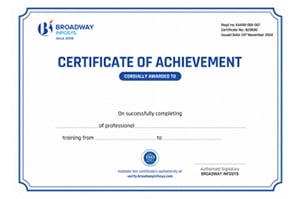Prompt Engineering has recently emerged among the most in-demand job skills in today's world, driven by AI. The Prompt Engineering Course at Broadway Infosys will teach you the art of interacting with AI tools like ChatGPT and other large language models. This course will benefit students, practitioners, or business people to extract accurate, creative, and valuable results from AI.
This course gives practical training on writing better prompts, controlling AI responses, working step by step through problems, and applying AI to real-world tasks like content creation, data extraction, or decision-making. It will also deal with some hands-on labs, project work, and usage of AI on an ethical basis.
By the end of this course, you will gain the confidence to use AI tools efficiently and can explore job roles like Prompt Engineer, AI Content Creator, or AI Assistant Developer.
```

REQUIREMENTS:
REQUIREMENTS:
REQUIREMENTS:
REQUIREMENTS:
Add this credential to your LinkedIn profile, resume, or CV to stand out to recruiters.
